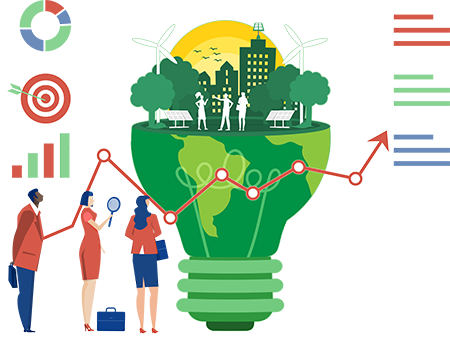RESPONSIBLE INDUSTRY 5.0
LEADERSHIP AND ORGANIZATIONAL CULTURE IN MANUFACTURING

Resilient by design
The rapid expansion of data-driven technologies in manufacturing offers new paradoxes to address pressing economic, environmental, and social challenges. While large enterprises often lead in implementing data-driven decision-making, small and medium-sized enterprises (SMEs) struggle to impact the full potential of data due to limited resources, expertise, and readiness. The transition toward Industry 5.0 introduces a shift by emphasizing not only economic and technological advancements but also social and environmental impact, integrating human-centric approaches into manufacturing.
Implications for responsible Industry 5.0
Industry 5.0 builds upon the foundations of Industry 4.0 but extends its focus beyond automation and efficiency to include human collaboration, sustainability, and social well-being. Scholars emphasize that while Industry 4.0 prioritized smart technologies such as IoT, AI, and data analytics, Industry 5.0 advocates for a balanced integration of human intelligence and machine capabilities. The European Commission has identified Industry 5.0 as a framework to ensure that digital and technological advancements contribute to resilience, sustainability, and inclusivity.
A key aspect of Industry 5.0 is its potential for social impact. By embedding resilience, accessibility, and equity within data-driven manufacturing, organizations can enhance supply chain robustness, support disaster recovery, and create inclusive work environments. However, achieving these objectives requires not only technological readiness but also a cultural transformation within organizations that prioritizes digital leadership and data driven decision-making.
Critical enablers drive data-driven culture and decision-making and relate to leadership empowerment, organizational capabilities, data literacy, and employee beliefs. First, leadership plays a pivotal role in fostering a culture of data-driven readiness. Leaders who champion data utilization, encourage experimentation, and align data-driven strategies with broader organizational goals create an environment where employees feel empowered to leverage data in their decision-making.
Second, a data-driven culture is reinforced by an organization’s ability to establish governance mechanisms, develop infrastructure, and institutionalize best practices for data use. Such organizational capabilities can synergistically enhance digital transformation success, thereby improving firm performance. Third, employees must possess the skills and knowledge to interpret and apply data effectively. Training programs, upskilling initiatives, and a commitment to continuous learning help SMEs bridge the gap between data availability and meaningful application. Fourth, organizational culture is shaped by employees’ attitudes toward data driven practices. When employees recognize the value of data in improving workflows, enhancing productivity, and addressing social challenges, they are more likely to adopt data-driven behaviors. Administrative and technical barriers, such as siloed data structures and resistance to change, were found to impact the relationship between data driven culture and decision-making.

I. Resilience and economic impact
A well-developed data-driven culture enhances an organization’s ability to respond to disruptions. By integrating predictive analytics and real-time data processing, SMEs can improve supply chain resilience, anticipate risks, and ensure continuity during crises such as natural disasters or pandemics. Moreover, data sharing ecosystems can facilitate humanitarian efforts by optimizing logistics for emergency relief operations and ensuring equitable distribution of resources.

II. Equitable and inclusive workplaces
Industry 5.0 emphasizes the human aspect of digital transformation, advocating for workplaces that are accessible, diverse, and inclusive. A strong data-driven culture can help SMEs implement fair hiring practices, monitor workplace equity, and personalize employee development programs. Digital leadership plays a crucial role in fostering an inclusive culture where all employees, regardless of background or skill level, can benefit from data-driven advancements.

III. Sustainable manufacturing practices
Organizational culture that values data-driven insights can support SMEs in adopting sustainable practices. By leveraging data analytics, companies can optimize resource utilization, reduce waste, and align manufacturing processes with circular economy principles. This contributes to the environmental pillar of responsible Industry 5.0, ensuring that digital transformation supports long-term sustainability goals.
The path forward for SMEs
For SMEs to fully realize the benefits of responsible Industry 5.0, fostering a strong data-driven culture is essential. This requires committed digital leadership, targeted investments in data literacy, and a shift in organizational mindsets toward embracing data for decision-making. By embedding resilience, accessibility, and equity into their data strategies, SMEs can move beyond economic gains and contribute meaningfully to humanitarian and societal challenges.
In the future, we should further explore applications of data-driven culture in SMEs, examining how different socio-economic and regulatory contexts influence the adoption of responsible Industry 5.0 practices. Additionally, industry collaborations and policy interventions can support SMEs in overcoming barriers to digital transformation, ensuring that technological advancements translate into tangible benefits for society at large.
